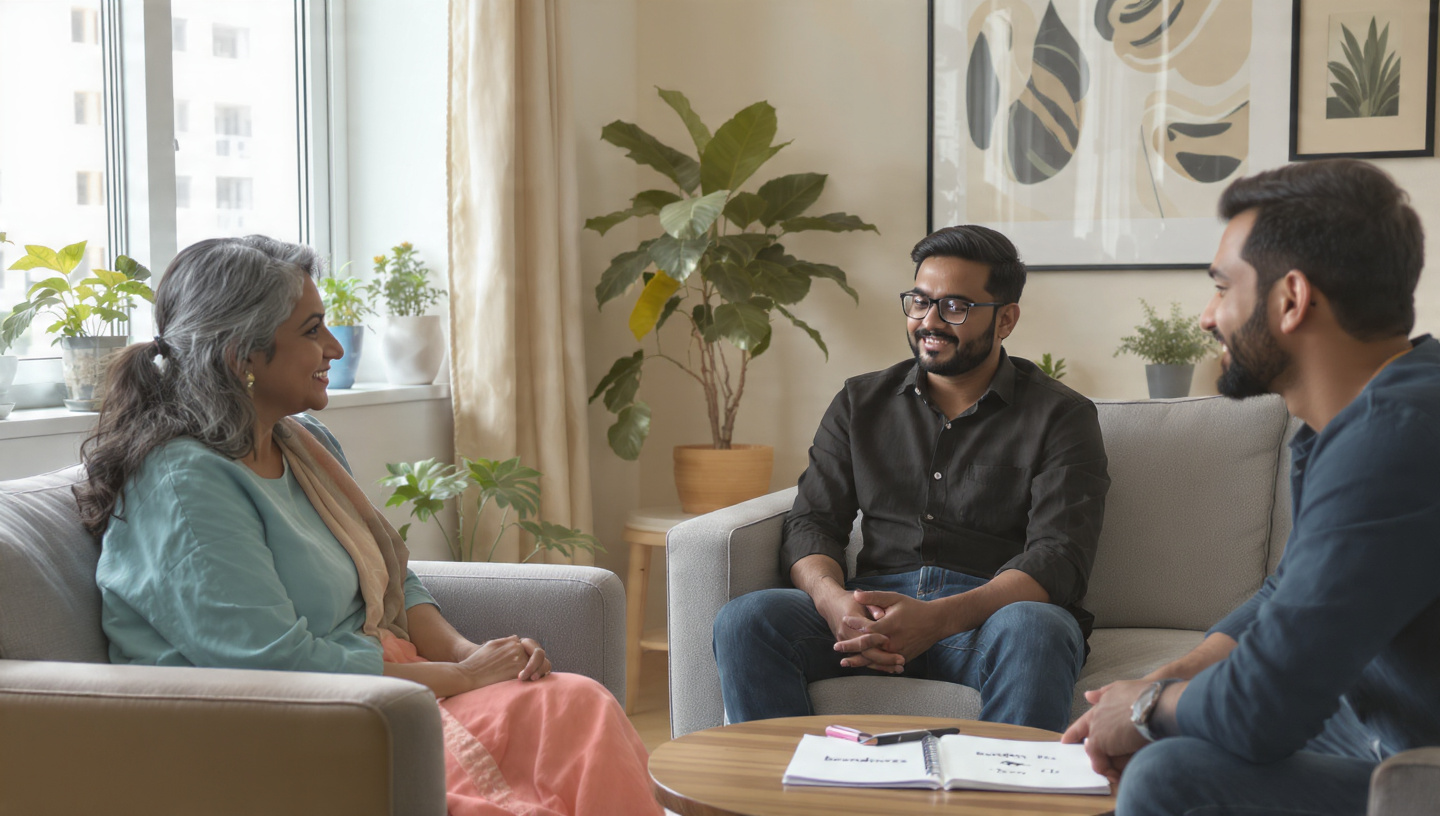“Yaar, usne toothpaste cap band nahi kiya!”
Sounds silly, right? But trust me — it’s often this tiny toothpaste cap that becomes the silent trigger for huge emotional storms in relationships.
As a Counsellor & Mind Healer, I’ve seen couples walk into my clinic saying, “It’s not a big fight, but I just feel so emotionally exhausted.” Most of them? Moved in together too soon.
What started as Netflix & comfort slowly turned into silent treatment & emotional distance.
Because living together isn’t just about sharing space — it’s about sharing habits, triggers, boundaries, and mental bandwidth.
And that’s where many Gen Z couples are unknowingly stepping into a psychological trap.
also read: how past trauma shapes your healthtoday?

If you’ve ever thought —
“We were perfect until we started living together...”
You’re not alone.
Many young couples feel blindsided when the romantic chemistry turns into emotional chaos.
Suddenly, you notice:
And internally, you start thinking:
“Maybe we aren’t meant for each other.”
But the truth is — it’s not that love disappeared. It’s that boundaries blurred too fast.
This cohabitation trend among Gen Z — while modern and progressive — has brought with it a rise in relationship anxiety, emotional burnout, and even micro-traumas that aren’t talked about enough.
also read: 7 signs your addiction may be hidingdepression

Here’s what I often hear in therapy sessions with Gen Z couples:
Psychologically, these are signs of premature emotional merging — where two individuals start sharing daily life before their emotional foundations are strong enough.
Common symptoms include:
This is not about blame — it’s about timing. Relationships need emotional maturity before physical proximity.
also read: 5 ways couples reignite love after along break
From a clinical psychology standpoint, this situation relates to a mix of Attachment Patterns and Adjustment Disorders.
According to DSM-5 (Diagnostic and Statistical Manual of Mental Disorders), many such individuals exhibit:
Similarly, ICD-11 (International Classification of Diseases) classifies these patterns under Stress-related Disorders and Relationship Problems within Primary Support Group.
In simple words — moving in too soon can unconsciously trigger our attachment wounds (from childhood or past relationships).
The constant closeness acts like a mirror, showing our insecurities louder than before.
That’s why you start fighting over things that seem trivial — they’re not about “dishes” or “chores,” they’re about control, validation, and fear of losing self.
also read: how texting culture is changing genz relationships

Recent studies have shown that Gen Z couples who move in before 1 year of dating experience higher levels of:
A 2023 research paper from Journal of Social and Personal Relationships found that couples who lived together within the first 6 months reported 40% higher conflict frequency than those who waited longer.
Another study by Pew Research Center revealed that Gen Z prioritizes emotional closeness but struggles with conflict resolution and emotional boundaries — making early cohabitation psychologically taxing.
So, it’s not about right or wrong — it’s about readiness.
also read: the real psychology behind left onread anxiety
I remember one of my clients — let’s call her Aarushi.
She was 24, ambitious, deeply in love, and moved in with her boyfriend within 3 months.
At first, it felt magical. “We make breakfast together!” she said during our first session.
But by the fourth session, her voice cracked —
“I don’t recognize myself anymore. I’m always anxious, scared to upset him.”
As a Mind Healer, I helped her explore that she wasn’t broken — she was overexposed emotionally.
Her nervous system wasn’t given enough time to adjust to shared living.
Through therapy, she learned to set healthy emotional boundaries and took a brief space to rebuild her individuality.
Months later, she returned saying, “We’re together again — but this time, with breathing room.”
That’s when I realized:
Love doesn’t need speed. It needs space.
also read: how disorders like insomnia fueldepression?

Let’s do a quick self-check exercise I often give my clients:
1. Draw two circles — one for you, one for your partner.
2. Inside each circle, write what makes you feel peaceful and emotionally stable (your self-care, space, goals).
3. In the overlapping middle area, write what you both share — time, activities, or habits.
4. Now check — are your individual circles too small?
If yes, you’ve probably blurred your emotional boundaries.
Spend one evening a week completely alone — no texting, no calls, no social updates.
Do something just for yourself.
It’s not distance; it’s emotional maintenance.
Because when you refill your cup, your love overflows more naturally.
also read: how isolation triggers illness anddepression together?
Of course, this is just the starting step.
Real healing involves deeper guided work — like exploring attachment styles, learning emotional regulation, and understanding trauma responses that get triggered in closeness.
These are not one-size-fits-all solutions.
Each couple’s story is different, rooted in their unique emotional histories.
And as I often tell my clients —
“It’s not about fixing your partner. It’s about understanding yourself in love.” 💛
also read: how to stop the cycle of pain anddepression?
If any part of this story feels like your own — if you find yourself constantly anxious, confused, or emotionally drained while living together — please remember:
You don’t have to figure this out alone.
As a Govt.Recognized Counsellor & Mind Healer, I help couples and individuals rebuild emotional balance and create healthy, loving spaces.
🌷 If this feels familiar, let’s talk.
Book your 1:1 consultation here — gentle, private, and judgment-free.
Because your relationship deserves peace, not pressure. 💫
👉 Begin Your Journey with a 1 on 1 Consultation
👉 Begin Your Journey with a 1 on 1 Consultation

Many Gen Z couples move in quickly due to emotional excitement and the desire for closeness. However, without strong emotional boundaries, it often leads to relationship anxiety, emotional burnout, and conflict. Living together too soon magnifies unresolved insecurities, causing regret later.
also read: what to do when i love you gets noreply?
Common signs of early cohabitation stress include:
If these sound familiar, it’s time to re-evaluate emotional boundaries.
also read: how fear of rejection kills realconnection?
Moving in early can trigger adjustment disorder, relationship anxiety, or attachment issues (DSM-5 classification). The sudden closeness can cause stress, mood swings, and emotional over-dependence, especially if personal space is lost.
also read: why timing turns simple talks intobig arguments?
There’s no one-size-fits-all rule, but research suggests waiting at least 1 year helps build emotional maturity, communication, and trust. The goal is not speed — it’s readiness. Love grows stronger when both partners have stable individual lives first.
also read: how everyday pressure breaks yourmind?
Yes, absolutely. With therapy, clear boundaries, and emotional awareness, couples can rebuild a healthy dynamic. Taking small breaks, engaging in self-care, and guided counseling help reset emotional balance without ending the relationship.
also read: do voice notes kill realconversations?
These steps help prevent emotional overload and sustain long-term connection.
also read: how bias turns into deep depression?
If you constantly feel drained, anxious, or disconnected, even without major fights, it’s a sign to reach out. Early therapy intervention helps you rebuild trust, improve communication, and protect mental well-being.
also read: how to tell if emotional separationhas already started?
💛 If this feels like you, remember — you don’t have to do it alone. Book your 1:1 consultation here
